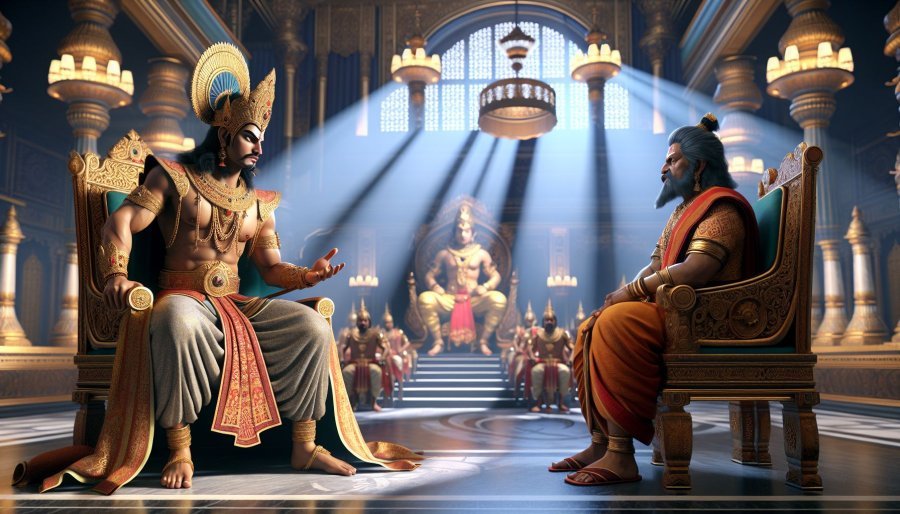Section XLIII - Bhishma's defiance and the wrath of the kings
Book index: Mahabharata (English)
This page contains a summary of the Mahabharata Section XLIII including examples of moral lessons in daily life. The Maha-Bharata is one of the largest epics ever written containing roughly 100,000 Sanskrit verses. It deals with the legendary history of ancient India and contains a large number of interwoven tales.

Short summary of the chapter:
The story begins with Bhishma expressing his belief that the ruler of Chedi, who summoned the kings to fight, is being influenced by Lord Krishna. The king of Chedi, angered by Bhishma's praise of Krishna, challenges Bhishma to praise other kings instead. He questions why Krishna is being praised over other mighty warriors like Karna, Drona, and Asvatthaman. He accuses Bhishma of disrespecting other powerful kings by constantly praising Krishna.
In response, Bhishma defends his actions by stating that he sees no one on earth equal to Krishna. The king of Chedi, unhappy with Bhishma's response, suggests that he should be slain or burned in a fire. Bhishma remains defiant, placing his foot on the heads of the kings and challenging them to summon Krishna for battle. He declares that anyone seeking death should face the powerful Lord Krishna in combat.
The enraged kings suggest attacking Bhishma, but he remains defiant, expressing his unwavering faith in Krishna's unmatched power. He challenges the kings to face Krishna in battle if they seek their own destruction. Despite the threats and anger of the kings, Bhishma stands firm in his belief in the supremacy of Lord Krishna. The tension between Bhishma and the kings escalates as they contemplate how to deal with Bhishma's unwavering loyalty to Krishna.
Ultimately, Bhishma's unwavering faith in Lord Krishna and his refusal to back down from his beliefs lead to a standoff between him and the angry kings. The story highlights the conflict between Bhishma's devotion to Krishna and the kings' desire to assert their authority. Despite the escalating tension and threats of violence, Bhishma remains steadfast in his faith, challenging the kings to face the mighty Lord Krishna if they wish to challenge him. The story ends with a sense of unresolved conflict and the underlying power dynamics at play between Bhishma, the kings, and Lord Krishna.
Full English translation:
This page is merely a summary which is automatically generated. If you are looking for authentic sources such as the Sanskrit text or the Full English translation of Mahabharata Section XLIII - Bhishma's defiance and the wrath of the kings, have a look at the following articles:
Section XLIII, online text
English translation by Kisari Mohan Ganguli.
Read this and other chapters online.
Mahabharata (English Summary)
by Kisari Mohan Ganguli | ISBN-10: 8121505933
Buy the latest edition:
FAQ of Mahabharata, Section XLIII:
Why was Krishna mentioned as the purpose behind the war?
Bhishma believed that Krishna was influencing the ruler of Chedi to summon the battle.
Why did the king of Chedi get angry at Bhishma?
The king was enraged when Bhishma praised Krishna over other powerful kings.
How did Bhishma respond to the angry kings?
Bhishma confidently declared himself beholden only to Krishna, inviting battle.
What was the outcome of the heated exchange?
The kings threatened to harm Bhishma, who remained unapologetic and defiant.
Daily life: Bhishma's defiance and the wrath of the kings:
The story narrates a conflict of perspectives and recognition of true power amidst a gathering of kings and warriors, urging us to look beyond superficial judgments and acknowledge deeper truths in our daily lives. Bhishma's unwavering praise for Krishna amidst criticism and hostility emphasizes the importance of understanding and valuing the essence of divine or exceptional qualities in someone, rather than being swayed by societal norms or peer opinion. This teaches us the significance of sticking to our beliefs and values, even when faced with opposition or ridicule.
In the face of criticism, rather than resorting to a verbal altercation, Bhishma suggests looking beyond words, as they can lead to endless disputes. This demonstrates the futility of arguments and highlights the importance of actions and resolutions over endless debates. The reactions of the kings, filled with anger and threats, serve as a reminder of how easily individuals can be provoked and the danger of letting emotions dictate responses to situations.
Moreover, the story emphasizes humility and the recognition of one's position in the grand scheme of things. Bhishma's acknowledgment of being alive at the pleasure of the rulers, yet not regarding them highly, underscores the balance between understanding one's role and maintaining a sense of self-worth. This serves as a lesson in humility and respect for all, regardless of their apparent status or power.
Lastly, Bhishma's challenge to confront Krishna if anyone wishes for a swift end, symbolizes the ultimate surrender to higher powers, acknowledging that there are forces beyond our control and understanding. This encourages us to focus on what we can control - our actions, responses, and attitudes towards life's challenges, and to seek wisdom and strength beyond the immediate and visible.
Incorporating these principles in daily life means standing firm in our values, approaching conflicts with wisdom rather than aggression, practicing humility, and acknowledging both our strengths and limitations.
